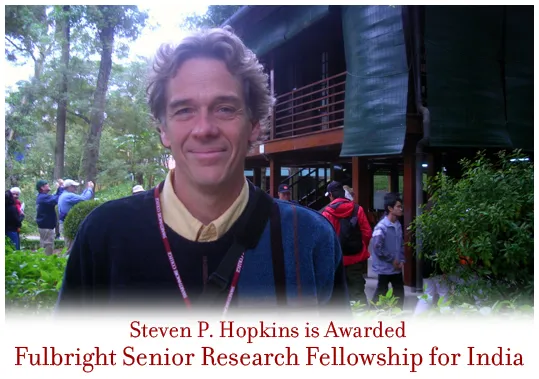Steven P. Hopkins is Awarded Fulbright Senior Research Fellowship for India

Steven P. Hopkins, currently Associate Professor and Chair of the Department of Religion, has been awarded a J. William Fulbright Foundation Senior Research Fellowship to complete work on a book length project in South India during the academic year 2009-10 entitled Bodies of Desire, Bodies of Lament; Time, Love, and Landscape in a Messenger Poem of Medieval South India. While in India, Hopkins will be affiliated with Institute Français d'Indologie, Pondichéry, Tamil Nadu. This is Hopkins's third Fulbright Fellowship. Fulbright alumni include heads of state, judges, ambassadors, cabinet ministers, CEOs, university presidents, journalists, artists, professors and teachers. Since its inception more than 60 years ago, approximately 300,000 Fulbrighters have participated in the Program.
The core of Hopkins's project is a translation into American English verse, with introduction, detailed notes, and expanded thematic afterward, of a medieval Sanksrit "messenger poem" or sandesha kavya, the Hamsasandesha or "Goose Messenger," composed by the thirteenth-fourteenth century South Indian Shrivaishnava philosopher-theologian and saint-poet Venkatanatha or Venkatesha, popularly known by his epithet Vedantadeshika, Preceptor of the Vedanta (c.1268-1369). Building on his previous work on Venkatesha's poetry in Singing the Body of God (Oxford, 2002), in An Ornament for Jewels (Oxford, 2007), and in separate articles on the themes of love, particularity, ideal bodies, and women's laments in Sanskrit, Tamil, and other religious literatures, Hopkins explores ways in which Venkatesha re-envisions the pan-Indian story of Rama and Sita (both god and goddess, king and queen) in his sandesha, using motifs of vulnerable love and violent emotion present in his own South Indian Tamil devotional tradition -- the agonies of separation, lament, loss, keening desire and anticipated bliss, written into the living particularized bodies of lover and beloved, in the "messenger" goose, and in the landscapes surrounding them.



